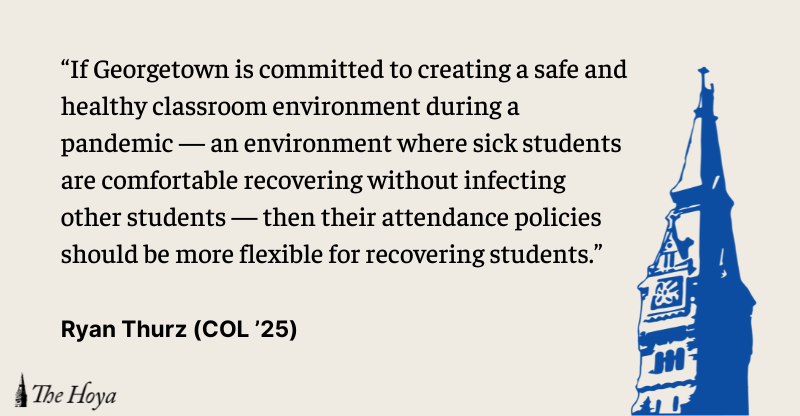Releasing a sigh of relief is not a normal reaction after testing positive for COVID-19.
A few weeks ago, though, this was my reaction as I tested to determine the cause of my insufferable symptoms. Despite an intimidating schedule of several midterms and papers due in the week ahead, all I could focus on was my ceaseless exhaustion, coughing and sore throat.
For me, COVID-19 was an acceptable excuse to miss class and focus on my recuperation.
But I did not know what I would have done if my test had come back negative and I was not sent to isolation. Despite my symptoms, it would have been much more questionable if I had chosen to miss classes.
Though this situation may be personal, there is a struggle that many students face: Georgetown University’s current policies and lack of flexibility make it impossible for students to be sick on campus. It is time for the university to restructure some of its policies, such as through the standardization of attendance protocols, to better accommodate for unwell students.
There is no denying that the student culture of pre-professionalism is rigorous and intense at Georgetown. Students are constantly on the go, doing their best to balance their highly demanding academic life with extracurricular activities, internships and jobs.
This busy lifestyle is disrupted entirely when a student is sick — an inevitable reality — and is unable to meet the demands of such a packed schedule. Unfortunately, though, when a student is sick, life goes on, including classes.
Georgetown’s class attendance policies encourage students to contact professors of any planned absences throughout the course of the semester all the way before the add/drop period ends. As delinanted on their website in their academic standards, the university advises students with unanticipated absences to “review the attendance policies in their syllabi and consult with instructors about the effect of absences.” In other words, policies regarding class attendance are left to the jurisdiction of individual professors.
In my experience, I have found that these policies collectively tend to be very strict. The aforementioned “effect of absences” in Georgetown’s policy tends to be a regulation that gives students a limited number of excused absences, which can be as low as two classes, before a professor lowers a student’s grade substantially, sometimes by a whole letter grade for one additional missed class.
Attendance policies tend to be highly specific and formulaic and are outlined in their course syllabus. Beyond the strictness of these policies, I have also found that the lack of commonality in these very specific rules has been difficult to account for. Some professors tend to have more lenient policies than others, while almost all of my classes had very different consequences for exceeding a certain number of absences.
Faced with this situation, many students choose the alternative route when it comes to recovering from a mid-semester illness: “powering through.” This consists of doing the bare minimum to assess and combat the sickness, going about one’s normal and very long daily schedule, and continuing to sacrifice sleep for the sake of a grade. Nonetheless, this strategy of not giving the illness the necessary attention it requires can only prolong an illness or create long-term problems.
The work-centric student culture is not necessarily something that Georgetown can fix directly or easily, given the makeup of the student body and their high-achieving personality types. What the university can more directly affect, however, are some of their rigid and unrealistic policies that create a situation where sick students choose to just “power through.”
While attendance policies are designed to keep students accountable for their learning and participation, there must also be a point where the university recognizes the commitment of their students. Georgetown is one of the world’s most prestigious academic institutions, hosting some of the most academically driven students from around the world. Unsurprisingly, most Georgetown students who miss a class will not treat it as a free day, but will instead take proactive steps to not fall behind, such as by conferring with their professor in office hours.
If Georgetown is committed to creating a safe and healthy classroom environment during a pandemic — an environment where sick students are comfortable recovering without infecting other students — then their attendance policies should be more flexible for recovering students.
The Georgetown administration must limit professors’ ability to craft their own policies for course attendance. They must institute a university-wide procedure for how to factor attendance into student grades, taking into consideration the unpredictability of illness and the importance of taking time to rest and recover. By doing these things, and more, Georgetown will take tangible steps to better accommodate sick students.
Ryan Thurz is a first-year in the College.















Anonymous • Apr 27, 2022 at 9:39 pm
This is so absurdly false. I have some pretty serious health issues and have had to miss class many times this semester. If I am clear and transparent about my absence, never has a professor told me or marked that as unexcused. Furthermore if you are sick enough to miss class go see student health and receive a doctors note. Also lectures are very often recorded now and can be attended through zoom.